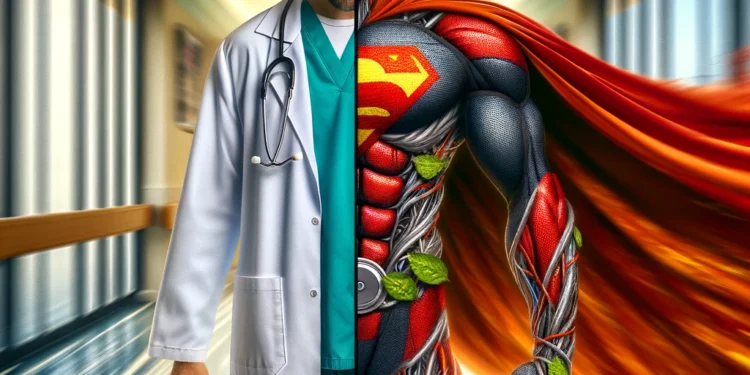
Hero healers. Clap for carers. Remember these? While it was nice to be appreciated, we are not superheroes. We are humans. Making us more than we are can do more harm than good.
The outpouring of public appreciation and support during the pandemic was a much-needed morale boost for those on the front lines. However, as time has passed, there is a growing concern that the constant praise may have unintentionally contributed to reinforcing a medical culture of invincibility and infallibility.
Hero healers. Clap for carers. Remember these? While it was nice to be appreciated, we are not superheroes. We are humans. Making us more than we are can do more harm than good. "
In the early days of the pandemic, the “clap for carers”, tributes, and gratitude expressed for physicians, nurses, and other healthcare workers were a source of strength to many of us. It was a recognition of our unwavering dedication, selflessness, and tireless efforts in the face of an unprecedented crisis. People who normally just got on with their work were suddenly being appreciated.
However, as the dust settles, could this narrative of invincibility potentially overshadow the very real vulnerabilities and limitations inherent in humans delivering healthcare?
One unintended consequence of portraying healthcare professionals as heroes is the expectation that we should be impervious to the strains of our profession.
The pressure to live up to this idealized image in the face of huge and increasing demand can contribute to burnout and mental health challenges.
This in turn may create an environment where expressing vulnerability or seeking help is perceived as a sign of weakness, contradicting the very essence of a supportive healthcare culture.
Indeed it was so before the pandemic: doctors are the worst at reaching out for help.
This in turn may create an environment where expressing vulnerability or seeking help is perceived as a sign of weakness, contradicting the very essence of a supportive healthcare culture. Indeed it was so before the pandemic: doctors are the worst at reaching out for help.
While the intention behind portraying healthcare professionals as heroes is to inspire confidence, it might inadvertently create unrealistic expectations from the general public (and their attorneys).
If the public perceives healthcare professionals as superheroes, it may lead to a sense of detachment and a lack of understanding regarding the serious challenges we face in the healthcare system.
Patients, rightly, demand care. This care should not be impeded by excessive administrative burdens, defensive medicine, and unrealistic clinical demand.
Moreover, the expectation that healthcare heroes should always have the right answers and make flawless decisions may discourage a culture of transparency and self-reflection that is vital for continuous professional development. It can affect public expectation (already unrealistic in many ways) of what medicine can achieve and the risk equation of everything in life.
It is essential to strike a balance between acknowledging the heroic efforts of healthcare professionals and recognizing our humanity.
As a profession we might want to shift the narrative towards a more realistic portrayal that appreciates the dedication, skills, and sacrifices of healthcare workers while acknowledging our human limitations.
This dose of reality can contribute to a healthier and more sustainable medical culture. This includes normalizing discussions around mental health (it can affect anyone and everyone), rest (we all need it), and the flawed humanity of all of us wounded healers.
While the appreciation for healthcare heroes during the COVID-19 pandemic was well-deserved and provided vital moral support, it is crucial to avoid perpetuating an unrealistic image of superhero invincibility.
By acknowledging the human aspects of healthcare professionals, we can promote a culture that values vulnerability, fosters continuous improvement, and strengthens the foundation of trust between healthcare providers and the communities we serve.
Healthcare heroes are not superheroes; recognizing this distinction is essential for the well-being of healthcare professionals and the patients we care for.
Let us know what you think! Human, hero, or superhero? Which one are you?
